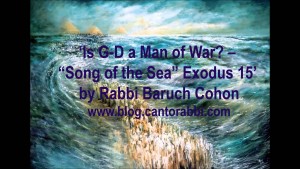IS G-D A MAN OF WAR? – “Song of the Sea” Ex.15 — by Rabbi Baruch Cohon
Of all the Torah portions assigned to Passover, perhaps the most dramatic is scheduled for the Seventh Day, this year Friday April 29th. Also probably the most familiar, since it is part of every morning’s prayers, it is the Song at the Sea – Shirat ha-yam – intoned by Moses and the Israelites on the shore of the Red Sea. That’s the far shore, the free shore, after they reach safety, and the pursuing Egyptian army doesn’t. As the Torah recounts, Moses split the sea, giving his people a path they could walk on.
However, the sea did not split so easily. Facing the danger of drowning, the people yelled at Moses: “Were there no graves in Egypt that you had to bring us here to die?” Desperate, Moses calls on G-d to help. He gets a curious answer: “Why do you cry to Me? Tell the people to go on!” Nobody moves, says our Midrash, until one man – Nachshon by name – sets foot in the water. He walks in, deeper and deeper, until the water reaches his chin and even wets his lips. And then suddenly the sea divides. The message? Take the lead, and with G-d’s help you can make things happen!
Once the people walk to freedom between walls of water, those walls then fall onto Pharaoh’s chariots and horsemen, submerging them. Impossible, you say? Just a few years ago, archeologists discovered something on the bottom of the Red Sea that added a new dimension to this miracle tale. They found the remains of gold covers from those ancient chariot wheels. The wooden wheels of the Egyptian chariots were long since decomposed, but the gold hubcaps survived.
Thrilled by their rescue, the men of Israel sang with Moses, and the women with Miriam, as we will hear this Friday: “I will sing to G-d for He triumphed gloriously!.. Horse and rider He threw in the sea… G-d is a man of war!”
Now wait a minute. We pray for peace in every service. The Priestly Benediction ends with the words “give you peace.” “Hello” in Hebrew is “shalom – peace.” How could Moses call G-d a man of war? Is that really what our faith is about?
Or do those words speak a warning? When a human force uses violence and perfidy to destroy selected victims, if that force cannot be contained or dealt with peacefully, will G-d inspire those potential victims to take action for themselves? Moses and Aaron tried negotiating with Pharaoh, time after time. Egypt had warnings, ten plagues in fact. But their policies did not change.
Why not? Maybe because Pharaoh saw how the Israelites multiplied. Arriving in Egypt with Jacob, they were 70 people. Over the course of 400 years of slavery, despite miserable living conditions, despite the royal order to the midwives to toss male Israelite babies in the Nile, by Moses’ time their birthrate produced 600,000 men of military age. Probably close to 2 million total population. Pharaoh’s answer? Genocide.
Facing genocide, whether from Pharaoh’s Egypt, Hitler’s Germany or – very possibly – Khamenei’s Iran, violent action may be a Divine imperative. Nachshon walked into the sea. Then G-d fought. Modern heroes dared danger to create the State of Israel which became a refuge for many Holocaust survivors. The name Nachshon became symbolic of one who dares to take chances.
We needed more Nachshons then, and we need them now. First comes victory. Then comes peace.



